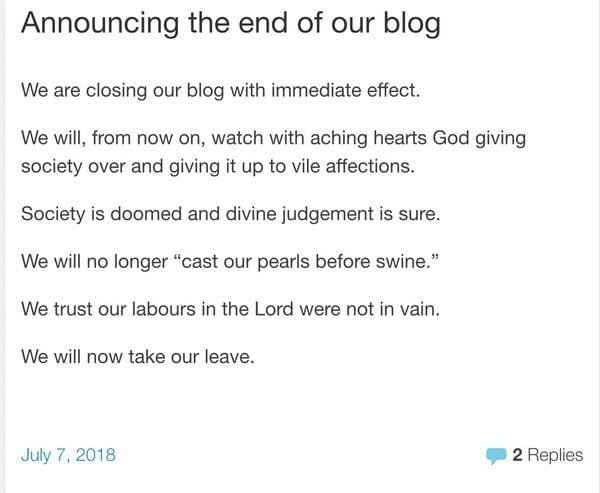
In the previous posts in this series, I talked a lot about the doctrines of grace, also known as the five points of Calvinism. Today, I want to talk about the sovereignty of God — the singular, overarching belief that binds Calvinistic theology together. What do Calvinists mean when they speak of the sovereignty of God? If there’s one book that every newly minted Calvinist has likely read — no, it’s not the Bible — it would be A.W. Pink’s classic, The Sovereignty of God. Since this book is widely accepted as the definitive Calvinistic statement on the sovereignty of God, I thought I would let Pink define the doctrine:
The Sovereignty of God. What do we mean by this expression? We mean the supremacy of God, the kingship of God, the godhood of God. To say that God is Sovereign is to declare that God is God. To say that God is Sovereign is to declare that He is the Most High, doing according to His will in the army of Heaven, and among the inhabitants of the earth, so that none can stay His hand or say unto Him what doest Thou? (Dan. 4:35). To say that God is Sovereign is to declare that He is the Almighty, the Possessor of all power in Heaven and earth, so that none can defeat His counsels, thwart His purpose, or resist His will (Psa. 115:3). To say that God is Sovereign is to declare that He is “The Governor among the nations” (Psa. 22:28), setting up kingdoms, overthrowing empires, and determining the course of dynasties as pleaseth Him best. To say that God is Sovereign is to declare that He is the “Only Potentate, the King of kings, and Lord of lords” (1 Tim. 6:15). Such is the God of the Bible.
….
The Sovereignty of the God of Scripture is absolute, irresistible, infinite. When we say that God is Sovereign we affirm His right to govern the universe which He has made for His own glory, just as He pleases. We affirm that His right is the right of the Potter over the clay, i. e., that He may mold that clay into whatsoever form He chooses, fashioning out of the same lump one vessel unto honor and another unto dishonor. We affirm that He is under no rule or law outside of His own will and nature, that God is a law unto Himself, and that He is under no obligation to give an account of His matters to any.
Sovereignty characterizes the whole Being of God. He is Sovereign in all His attributes. He is Sovereign in the exercise of His power. His power is exercised as He wills, when He wills, where He wills. This fact is evidenced on every page of Scripture.
Simply put, saying God is sovereign means that He alone is responsible for and controls EVERYTHING! Of course, such a statement quickly leads to the critics of Calvinism saying, so God is culpable for sin? Calvinists have all sorts of arguments they use to get around this logical conclusion, including answering in the affirmative — Yes, God is responsible for sin. If God is sovereign and decrees all that happens without exception, then the only conclusion one can come to is that God is responsible for sin. So what? some Calvinists say. God is God and he can do whatever he wants to do. Whatever God does is right because it is God who is doing it. When objections are raised, Calvinists reply, God’s thoughts are not our thoughts and his ways are not our ways. In other words, he is God, the creator and we are the created. He is the potter, as the book of Romans says, and we are the clay. God can and does do whatever he wants, and as the Apostle Paul says in Romans 9, those who object to God’s sovereignty need to shut the hell up (okay, he didn’t say it like that word for word, but you get my point). As finite beings, mankind has no right to criticize or condemn God’s works.
When I first came to know and understand the sovereignty of God, I was relieved. For the longest time, I was burdened with carrying a church congregation on my shoulders. While God was certainly there right along beside me, I knew it was up to me to get things done. As a Calvinist, I no longer felt pressured to get this or that done; that if God wanted me to do something he would bring it to pass; that if God didn’t want something done there was absolutely nothing I could do. Now, in retrospect, I know that the only way anything gets done is if I do it. I suspect that’s how it works for you in your life too. And Calvinism aside, a case can be made for taking this approach to life; that praying and “waiting” on God often become camouflage for laziness and indifference.
As the sovereignty of God permeated every aspect of my ministerial and personal life, how I approached things began to change. The first thing I did away with was giving altar calls — a manipulative tool popularized by nineteenth-century evangelist Charles Finney. The second thing I did was turn my attention away from aggressive evangelistic efforts. Instead, I focused more of my time on my studies; on preparing my sermons; on preparing lessons for Sunday school and, later, an elders’ class. As I mentioned in a previous post, I set my sights on un-saving congregants who had been saved during my Independent Fundamentalist Baptist (IFB) days. I believed that I had been preaching a truncated, bastardized version of the Christian gospel, so it was my solemn duty to preach the Calvinistic gospel. I learned, after six years of such efforts at one church, that it is much harder to get people un-saved than it is to get them saved. The third thing I did was breathe. God is in control, I told myself. No need to stress out over winning the lost. If God wanted them saved, well he would save them. My job was to preach the gospel.
During my early years as a Calvinist, I read John MacArthur’s book, The Gospel According to Jesus. In this book, MacArthur demolished my IFB soteriology. MacArthur believed: “The gospel call to faith presupposes that sinners must repent of their sin and yield to Christ’s authority.” IFB pastors generally believed that a person could be saved, yet not make Jesus Lord of their lives. The crux of the argument was whether sinners had to repent of their sins to be saved. Many IFB preachers believed in what Calvinists called decisional regeneration; the belief that by praying a simple prayer a sinner was saved. Requiring sinners to repent of their sins was, in the eyes of many IFB preachers, works salvation. MacArthur would not have any of that, saying that the lordship of Christ was not optional; that if a person was not willing to forsake his sin and totally follow Jesus there would be no salvation for him. (See One, Two, Three, Repeat After me; Salvation, Bob Gray Style.)
One story that stands out from this time is a written interaction I had with Curtis Hutson, editor of the Sword of the Lord — an IFB newspaper. Previous to Hutson, John R. Rice was the editor of the Sword. Rice had written in a tract titled What Must I Do to Be Saved? that sinners had to repent of their sins to be saved. No repentance, no salvation. Hutson, after taking over the Sword, decided to rewrite the part in the tract that talked about repentance. Hutson, like many of the big-name IFB preachers of the day, believed that repentance was a mere change of mind: I was against Jesus and now I am for him; I was headed east and now I am headed west; I was a sinner and now I believe in Jesus. Men such as Jack Hyles and Bob Gray, Sr. turned this intellectual assent into an art form. Thousands and thousands and thousands of people prayed the sinner’s prayer, believing that by doing so they became Christians. No mention of repenting of sin was mentioned. To do so was to preach “works salvation.” And that’s exactly what Curtis Hutson told me when I wrote him. I called him out on his secretive change of Rice’s tract. I told Hutson that he materially changed what Rice believed; that Rice’s gospel and his gospel were not the same. Hutson responded by telling me that I was preaching works salvation, a gospel that did not save.
Rice was no Calvinist, but he did believe that repentance was essential to salvation. If a person was not willing to forsake his sin and follow after Jesus, there would be no salvation for him. Back in my college days, I went door to door attempting to evangelize sinners. My goal was to share with them the simple plan of salvation (The Roman’s Road) and ask them if they wanted to be saved. If so, I asked them to pray the sinner’s prayer. (See The Top Five Reasons People Say the Sinner’s Prayer.) Once they prayed the prayer, I declared them to be newly-minted Christians. One day, I happened upon a woman I thought might need saving. As I started to go into my spiel, she — realizing I was one of those terrorist preacher boys from Midwestern Baptist College — stopped me and said, there’s no need for you to continue. I already did that. I asked her where she went to church and she replied, nowhere. I am saved now. Why do I need to go to church? Men such as Hyles, Gray, Sr, Dennis Corle, Hutson, Steven Anderson, and countless other IFB preachers believe that this woman, if she “sincerely” prayed the sinner’s prayer, was saved — a newborn child of God. Rice, MacArthur, and the now Calvinistic Bruce Gerencser believed the woman was still dead in trespasses and sins, and headed for Hell unless she repented of her sins and followed after the Shepherd, Jesus Christ.
As a Calvinist, I believed that sinners were spiritually dead, unable to believe without God giving them the ability to do so. Man was bound by sin, and unable to do anything about it unless God intervened. This intervention was called regeneration; the giving of life to dead sinners. For most (not all) Calvinists, regeneration preceded faith. Since unregenerate humans had no free will and were spiritually dead, it was impossible for them to believe on their own. As an IFB preacher, I believed faith preceded regeneration; that spiritual life came when a sinner, by faith, asked Jesus to save them. As a Calvinist, my response to this notion was this: how can a dead man do anything?
My goal, then, as a Calvinistic preacher, was to preach the gospel in the hope that what I preached would find fertile ground in hearts given life by the Holy Spirit. As an IFB preacher, so much of how people were saved depended on me: the right sermon, the right illustrations, the right delivery, the right invitation song. As a Calvinist, my objective was to simply preach the gospel; to declare the whole counsel of God. If sinners were going to be saved it was up to God, not me.
Numerically speaking, hundreds and hundreds of people were saved through my ministry and preaching as an IFB preacher. As a Calvinist, I saw a few people saved. As an IFB preacher, I expected people to be saved weekly. As a Calvinist, I found that months and months could pass without anyone saying that God had saved them. This, by the way, is typical. IFB churches tend to rack up large numbers of converts, whereas in Calvinistic churches conversions are few. IFB churches tend to focus on quantity, and Calvinistic churches on quality. Which is better? It all depends on what matters to a preacher. Does he want big attendance numbers, or does he value the intellectual growth of congregants?
Let me illustrate this difference with what is commonly called The Great Commission:
Go ye therefore, and teach all nations, baptizing them in the name of the Father, and of the Son, and of the Holy Ghost:
Teaching them to observe all things whatsoever I have commanded you: and, lo, I am with you always, even unto the end of the world. Amen. (Matthew 28:19,20)
IFB churches tend to focus on verse 19: Go ye therefore, and teach all nations, baptizing them in the name of the Father, and of the Son, and of the Holy Ghost. The goal is to preach the gospel to the whole world. Calvinistic churches, on the other hand, tend to focus on verse 20: Teaching them to observe all things whatsoever I have commanded you. The goal is to teach followers of Christ his commandments. Rare is the church that fulfills both parts of the Great Commission.
As I survey my years in the ministry, I have to say that my Calvinistic years were far more rewarding personally and intellectually. I enjoyed the hard work required for crafting good sermons. I enjoyed spending hours upon hours reading books and studying the Bible. When I was an IFB preacher, my life was consumed with the ministry, with winning souls, with building a growing church. As a Calvinist, I was content to be the resident intellectual; a man paid to study the Bible and read awesome books. I still cared about the souls of attendees and church members, but I no longer felt pressed to perform. Above all, as a Calvinist, I found that I had more time to spend with my wife and children.
In Part Five, I plan to write about how Calvinism affected my marriage and my relationship with my children. In particular, I plan to talk about birth control and family size. There’s a reason Polly and I have six children and why there are six years between child number three and child number four and why we stopped having children after our youngest son was born. Stay tuned.
Note
For you who are interested in the difference between Rice’s version of the tract What Must I Do to Be Saved? and Curtis Hutson’s:
Does not the Bible say that we must repent? Yes, the Bible plainly says that “God … commandeth all men every where to repent” (Acts 17:30), and again, “Except ye repent, ye shall all likewise perish” (Luke 13:3,5).
This was the preaching of John the Baptist, of Jesus, of Peter and of Paul, that men should repent. And certainly repentance is in God’s plan of salvation. The trouble here, however, is that men misunderstand what repentance means, and there has grown up an idea that repentance means a period of weeping and mourning over sin, or sorrow for sins. This idea comes from the Douay Version of the Bible which instead of “repent” says “do penance.”
So the place of inquiry, where people should be taught the plan of salvation from the Bible, in revival meetings, became “the mourner’s bench” and thousands of people have been taught that God would not hear their prayer nor forgive their sins until they went through a process of sorrow and mourning over their sins!
Do not misunderstand me. God is anxious for you to have a penitent, broken heart over your sins. You have gone away from God. You have trampled under foot the blood of Jesus Christ, wasted years of your life which you can never live over again. You have served your father, the Devil.
There is plenty for you to weep over, and I am not surprised if you feel deep shame and sorrow in your heart that you have so mistreated the God who made you and the Saviour who died for you. I am not surprised if you cannot keep back the tears! But what I want you to know is that tears or no tears, however much sorrow you may have in your heart, or not have, those things do not save you.
You ought to be sorry for your sins and ashamed of them. “Godly sorrow worketh repentance” (II Cor. 7:10)—the right kind of sorrow leads to immediate repentance, but mourning is not itself repentance.
“Could my tears forever flow,
Could my zeal no respite know,
These for sin could not atone;
Thou must save, and Thou alone.”To repent literally means to have a change of mind or spirit toward God and toward sin. It means to turn from your sins, earnestly, with all your heart, and trust in Jesus Christ to save you. You can see, then, how the man who believes in Christ repents and the man who repents believes in Christ. The jailer repented when he turned from sin to believe in the Lord Jesus Christ.
Curtis Hutson changed the tract to this:
Does not the Bible say that we must repent? Yes, the Bible plainly says that “God … commandeth all men every where to repent” (Acts 17:30), and again, “Except ye repent, ye shall all likewise perish” (Luke 13:3, 5). This was the preaching of John the Baptist, of Jesus, of Peter and of Paul, that men should repent. And certainly repentance is God’s plan of salvation. The trouble here, however, is that men misunderstand what repentance means, and there has grown up an idea that repentance means a period of weeping and mourning over sin, or sorrow for sins. This idea comes from the Douay Version of the Bible which instead of “repent” says “do penance.” So the place of inquiry, where people should be taught the plan of salvation from the Bible, in revival meetings, became “the mourner’s bench” and thousands of people have been taught that God would not hear their prayer nor forgive their sins until they went through a process of sorrow and mourning over their sins! The right kind of sorrow leads to immediate repentance, but mourning is not itself repentance.
Other posts on the Sovereignty of God
Is God Sovereign and Does Everything Happen for a Reason?
Does Everything Happen for a Reason?
Bruce Gerencser, 68, lives in rural Northwest Ohio with his wife of 47 years. He and his wife have six grown children and sixteen grandchildren. Bruce pastored Evangelical churches for twenty-five years in Ohio, Texas, and Michigan. Bruce left the ministry in 2005, and in 2008 he left Christianity. Bruce is now a humanist and an atheist.
Your comments are welcome and appreciated. All first-time comments are moderated. Please read the commenting rules before commenting.
You can email Bruce via the Contact Form.




